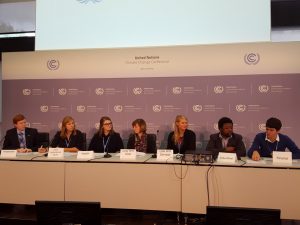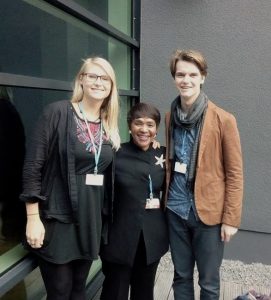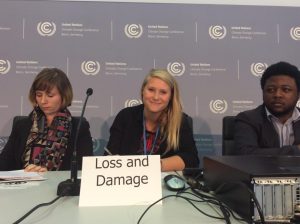A student perspective on COP21
Posted on 19th January 2016 by SRUCSA
Reflections from inside COP21 - January 2015 - Andrea Gadnert

Andrea (3rd from R) at the YOUNGO Press Conference at COP21
A few of weeks ago I was in that room where the worlds leaders where celebrating the new global agreement. No one was of course completely content with the text, but everyone happy to have an agreement and to be able to go home. I was at COP21 in Paris during the second week of the conference, working with youth groups, demonstrating and learning about the complexity of the negotiations. I had earlier this autumn been at an intercessional at the UNFCCC head quarters in Bonn, Germany, but that was not comparable to the size and the amount of people in Paris. The conference centre was massive and the schedule very intense, involving so much more than the actual negotiations.
One day could involve everything from listening to the quite dry negotiations in the plenary to presentations with IPCC, meeting with ministers, scientists and indigenous from around the world, big laud protests, a lot of free food and of course getting lost many times. Almost every day was a theme day highlighting important topics such as oceans, gender, mountains, long-term goals and side events about any kind of related topic was organised by universities, NGOs, business etc.
Unfortunately I don’t know much about what the UK delegation was up to, but my home country Sweden organised meetings for present Swedish civil society, keeping up to date what was happening behind the closed doors with the possibility of asking questions. However, these sessions were quite formal and we were more likely to get a clear answer about “who is blocking what” when catching someone in the corridor.

Andrea (L) with Diseko - ambassador for G77 and China
Not to be missed was the “Fossil of the Day”, a comedy show exposing the countries that have been the worst of the day, and is definitely worth checking out for a less dry and serious view of the negotiations. Saudi Arabia for example received first place for sending their minister of petroleum to negotiate climate change and for stating that we should not discriminate different types of energy… Another day, Australia was awarded for saying that coal will remain important for many years to alleviate world hunger, while US got the fossil for wanting that compensation to vulnerable countries should not only be left out of the agreement, but also wanting to add a text stating that it will never be required. This show is followed not only by civil society, but also delegates and rumours say that countries actually really don’t want to become the Fossil of the day.
I had the chance to be accredited to the conference as a part of the World YMCAs delegation, which is the world’s largest youth movement that works for gender equality, climate justice and to empower youth. I was part of a group with people from all continents, and a great mix of cultures and backgrounds. Our group also collaborates with Intergovernmental Union for Conservation of Nature (IUCN), and we were youth ambassadors attending their stalls at the conference during the gender day.
As I was there with a youth organisation I worked within YOUNGO, the youth consistency of the UNFCCC, where young people from around the world meet and work together to push for common policy points, communication and planning actions. Some of the topics that engage a lot of people are education, health, long-term goal (zero by 2050), intergenerational equity, human rights and especially the rights of indigenous peoples.
In general, an overall common view in YOUNGO is that standing up for the frontline communities is the most important role we have. I have worked within the policy group of Loss and Damage, the issue that addresses the destruction that cannot be limited by mitigation or adaptation. Loss and damage is a matter that was very disputed until the end, as some countries did not want to have it mentioned is the agreement at all. Now it is thankfully part of the legally binding text, even if in loose wordings.

YOUNGO Press Conference
I have also learned about the flaws of the negotiations, and particularly one is especially clear. While many industrialised Global North countries have very large delegations (small Sweden for example had 60 delegates), some other small countries with fewer resources have just a few delegates present. When there are many negotiations taking place in “spin-off groups” on the different topics, small delegations such as Dominica’s of two people, struggle to keep up with the negotiations and even more to make their voices heard.
Global South, often the most vulnerable to the impacts of climate change, is not accurately represented among civil society either. This is both due to visa and economical reasons, and something that many are working with to change. We did for example hand a proposal to the Swedish Government to fund youth from the Global South for next COP in Marrakech, something that other governments such as France are already doing.
I am trying to stay positive, even when the intended contributions currently taking the world to a catastrophic 3+ warming, and when the goal of 1.5°C that could save some vulnerable nations from vanishing, is soon to be requiring negative emissions (something we are very far from accomplishing). What makes me the most hopeful and the most positive impression I bring with me from the conference is the enormous amount of passionate people from around the world that are working for the same thing. I have met so many intelligent, creative, talented young people. I also have particularly appreciated meeting and learning from indigenous people from around the world and from my home country. So even if COPs don’t fully manage to create the agreement that the world needs, it has created a fantastic gathering for likeminded people to meet and work together.
I have also learned that it is actually possible to influence, even if it might be to small extents in the big picture. In the text that was the draft ahead of Paris, there was a whole paragraph on human rights written by YOUNGO, and put forward through the Philippines. Countries also said on the closing session that without civil society, 1.5°C would certainly not have been in the agreement.
Now there is much work ahead, and as has been repeated many times: The Paris agreement is not the end of anything, but rather a start. It is now to be implemented from 2020 and every 5 years, the countries will have to improve their INDCs (the intended contributions). The world’s eyes are soon on Marrakech, where the leaders meet again in November for COP22. The continuous work will hopefully take us even closer to a fair agreement that addresses what science is actually telling us, and that is protecting the most vulnerable that have contributed the least to the problem.
The open plenary sessions, press conferences and some side-events can be seen at the UNFCCC webcast:
http://unfccc6.meta-fusion.com/cop21/events
And some of the many interesting side-events can be seen at IISD:
http://www.iisd.ca/videos/climate/unfccc-cop21/
Fossil of the Day:
http://www.climatenetwork.org/fossil-of-the-day
Andrea is a 3rd year Environmental Student from Sweden who studies at the Edinburgh Campus of SRUC.
If you want to get involved in any environmental projects, campaigns or activism, contact your students' association.
